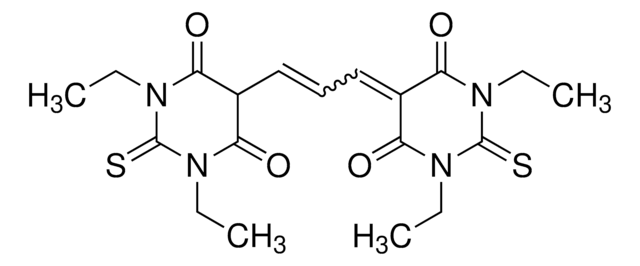D8064
4-(2-(6-(Dibutylamino)-2-naphthalenyl)ethenyl)-1-(3-sulfopropyl)pyridinium hydroxide inner salt
≥95% purity (HPLC), solid
Sinónimos:
Di-4-ANEPPS
About This Item
Productos recomendados
product name
4-(2-(6-(Dibutylamino)-2-naphthalenyl)ethenyl)-1-(3-sulfopropyl)pyridinium hydroxide inner salt, ≥95% (HPLC), solid
Quality Level
assay
≥95% (HPLC)
form
solid
mol wt
480.66
color
orange to dark red
solubility
DMF: soluble
DMSO: soluble
ethanol: soluble
ε (extinction coefficient)
≥38000 at 493-499 nm in methanol
application(s)
diagnostic assay manufacturing
hematology
histology
storage temp.
2-8°C
SMILES string
CCCCN(CCCC)c1ccc2cc(\C=C\c3cc[n+](CCCS([O-])(=O)=O)cc3)ccc2c1
InChI
1S/C28H36N2O3S/c1-3-5-17-30(18-6-4-2)28-13-12-26-22-25(10-11-27(26)23-28)9-8-24-14-19-29(20-15-24)16-7-21-34(31,32)33/h8-15,19-20,22-23H,3-7,16-18,21H2,1-2H3
InChI key
HAPJROQJVSPKCJ-UHFFFAOYSA-N
Categorías relacionadas
Application
Biochem/physiol Actions
Storage Class
11 - Combustible Solids
wgk_germany
WGK 3
flash_point_f
Not applicable
flash_point_c
Not applicable
ppe
Eyeshields, Gloves, type N95 (US)
Elija entre una de las versiones más recientes:
¿Ya tiene este producto?
Encuentre la documentación para los productos que ha comprado recientemente en la Biblioteca de documentos.
Nuestro equipo de científicos tiene experiencia en todas las áreas de investigación: Ciencias de la vida, Ciencia de los materiales, Síntesis química, Cromatografía, Analítica y muchas otras.
Póngase en contacto con el Servicio técnico
![4-(2-[6-(Dioctylamino)-2-naphthalenyl]ethenyl)-1-(3-sulfopropyl)pyridinium inner salt ≥95% (HPLC), solid](/deepweb/assets/sigmaaldrich/product/structures/276/606/9b895cb0-f3b8-42d2-bceb-a788c0bcf884/640/9b895cb0-f3b8-42d2-bceb-a788c0bcf884.png)







